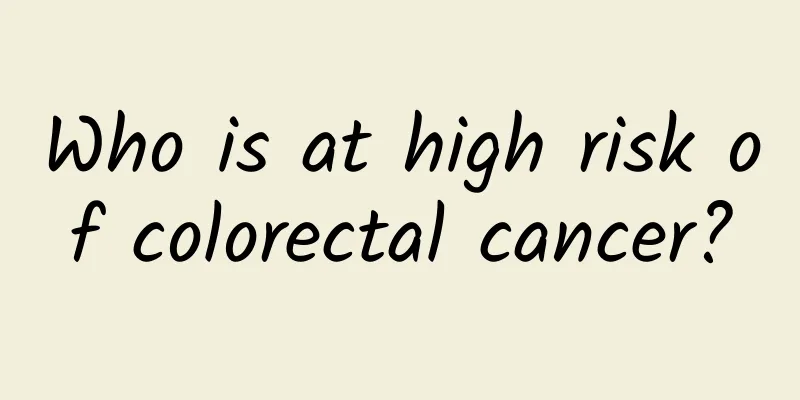Who is at high risk of colorectal cancer?

|
Intestinal cancer is not exclusive to middle-aged and elderly people. In China, the professional term for intestinal cancer is colorectal cancer. Its younger-onset trend is becoming increasingly serious, with the number of patients under 50 years old increasing rapidly at a rate of 2.1% per year. "I am young, I will not get intestinal cancer", this statement is completely wrong. Colorectal cancer is a common and often overlooked malignancy. Its early symptoms may include diarrhea, constipation, abdominal pain, fatigue, weight loss, abnormal darkening or blood in the stool, and unexplained discomfort. Once these symptoms occur, it is recommended to see a doctor immediately and follow the doctor's orders for a colonoscopy. Especially for people over 45 years old, even if there are no obvious symptoms, regular colonoscopy screening should be performed, because this age group is at a high risk of colorectal cancer. Another feature is that colorectal cancer often develops silently. 80%-90% of them gradually evolve from small polyps in the colon or rectum, and this process may take 5 to 10 years. Therefore, regular colonoscopies provide us with ample time windows to detect and treat early, or even remove them at the polyp stage, thereby preventing the occurrence of cancer. What are the high-risk factors for colorectal cancer? First, genetic factors play an important role in the development of colorectal cancer. If someone in your family, especially a first-degree relative - such as a parent or sibling - has been diagnosed with colorectal cancer, your risk of developing the disease may be four times that of the general population. In addition, certain hereditary diseases, such as familial adenomatous polyposis, also known as colon polyposis, have a high genetic predisposition, and the risk of such polyps becoming cancerous is high, so the corresponding risk of colorectal cancer is much higher. The second high-risk factor that needs attention is eating habits, especially high animal fat and high animal protein intake. Colorectal cancer is closely related to our eating habits. Scientific research has revealed that regular consumption of high animal fat and high animal protein foods, especially red meat and processed meat, is positively correlated with the risk of colorectal cancer. Of course, this does not mean that red meat cannot be eaten at all. Red meat is an important source of iron and high-quality protein, which is good for health. The key is to eat it in moderation. The third is frequent consumption of grilled and pickled foods. Research from the American Institute for Cancer Research points out that when meat is cooked at high temperatures, such as during grilling, two types of carcinogens may be produced: heterocyclic amines and polycyclic aromatic hydrocarbons. Laboratory studies have shown that these chemicals can change DNA structure and increase the risk of cancer. In addition to eating habits, unhealthy lifestyles, such as smoking and drinking, are also associated with a high risk of colorectal cancer. These habits may have a negative impact on intestinal health and increase the potential risk of cancer. Fourth, chronic inflammation of the intestine, especially special types of inflammation, such as ulcerative colitis. This type of inflammation is characterized by repeated inflammatory stimulation and repair processes, during which gene mutations may occur. If these mutations accumulate over a long period of time, they may lead to cell canceration and eventually develop into colorectal cancer. Fifth, there is a view that colorectal cancer is a "rich man's disease", which is reasonable to a certain extent. In economically developed regions, such as the Pearl River Delta, the Yangtze River Delta, and cities such as Shanghai, the incidence of colorectal cancer is higher. Therefore, people over 45 years old living in these high-incidence areas should be considered a high-risk group and should undergo regular colonoscopy examinations. Sixth, chronic digestive system symptoms such as long-term diarrhea or constipation, if these symptoms persist for more than half a year, may also indicate that you are at high risk of colorectal cancer. Seventh, patients who have undergone cholecystectomy or appendectomy. Studies have shown that patients who have undergone cholecystectomy or appendectomy may face a higher risk of colorectal cancer. Because cholecystectomy is generally caused by gallstones, the diet of these patients is high in animal fat and high in animal protein. In addition, after cholecystectomy, bile can be discharged directly into the intestines, which is irritating to our intestines, and increased bile secretion will stimulate the production of bile acid, which is a known carcinogen. Finally, if you have abdominal symptoms such as abdominal pain, blood in the stool, especially mucus and pus in the stool, and unexplained weight loss or anemia, these may be warning signs of colorectal cancer. Individuals with these conditions should be considered high-risk and should be given adequate attention. Although colorectal cancer is scary, by understanding its high-risk factors and early symptoms, we can take active measures to prevent and detect it early. Regular colonoscopy examinations are essential for adults over 45 years old, and a healthy lifestyle and eating habits also play a vital role in protecting our intestinal health. Let us be vigilant, take action, and fight colorectal cancer together. Author: Dr. Chrysanthemum Lin Guole Team Reviewer: Wang Qiang, deputy chief physician of the Department of Gastroenterology, Peking Union Medical College Hospital Produced by: China Association for Science and Technology Department of Science Popularization Producer: China Science and Technology Press Co., Ltd., Beijing Zhongke Xinghe Culture Media Co., Ltd. |
<<: Intestinal health: If you have hemorrhoids, can you just cut them off?
>>: How to choose between ordinary colonoscopy and painless colonoscopy?
Recommend
What causes pain and itching below
If women have vulvar itching, they will be misera...
Causes of breast shrinkage after breastfeeding
Breastfeeding is becoming more and more popular n...
Why does leucorrhea smell sour?
Leucorrhea is a very familiar friend to women, an...
Is it good to have an epidural during childbirth?
Labor analgesia is a technology, or more accurate...
Can you eat flounder without skinning it? How to choose flounder?
Flounder has tender meat with few bones and is su...
What to do if you get pregnant with a second child unexpectedly
I believe that many mothers think that creating a...
What kind of wine is good for your health before going to bed?
In the eyes of ancient poets, the most beautiful ...
Can aloe vera gel enlarge breasts?
Aloe vera gel is very common in daily life. Using...
Can I drink liver-nourishing tea during menstruation?
I believe many people have heard of liver-nourish...
Menstrual period is delayed for 10 days and has not come yet
Delayed menstruation is a common problem among mo...
What can I eat to delay my period?
The arrival of menstruation has a certain regular...
What medicine is good for uterine effusion
The uterus is an important part of the female bod...
A small pimple on the pubic hair
Every woman should pay attention to the health of...
How long does it take to get menstruation after removing the IUD? How to get it?
The contraceptive ring is an effective contracept...









